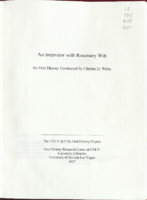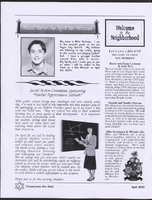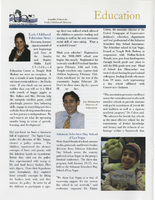Search the Special Collections and Archives Portal
Search Results

Transcript of interview with Rosemary Witt by Claytee D. White, November 7, 2006
Date
Archival Collection
Description
Text
University of Nevada, Las Vegas. University Libraries. Teacher Development and Resources Library
No description.
Corporate Body

Meeting minutes for Consolidated Student Senate University of Nevada, Las Vegas, February 9, 1989
Date
Archival Collection
Description
Text
Sandra F. Mack oral history interview
Identifier
Abstract
Oral history interview with Sandra F. Mack conducted by Claytee D. White on March 29, 2018 for the African Americans in Las Vegas: a Collaborative Oral History Project. In this interview, Mack discusses her early life in Seattle, Washington. She talks about her education in home economics, becoming a teacher, and her experience teaching during segregation. Mack recalls moving to Las Vegas, Nevada in 2001, and her involvement with community organizations 100 Black Women, the Las Vegas Branch of The National Association for the Advancement of Colored People (NAACP), the Urban League Guild, and the local Delta Sigma Theta chapter. Lastly, Mack talks about the 1 October shooting, gun violence, the increase of security at churches.
Archival Collection
Joan Olson Griffith oral history interview
Identifier
Abstract
Oral history interview with Joan Olson Griffith conducted by Sharee Schrader on April 12, 2005 for the History of Blue Diamond Village in Nevada Oral History Project. Griffith begins by discussing why she moved to Blue Diamond, Nevada with her family due to job opportunities at the Blue Diamond Plant, where they manufactured wallboard, in 1956. She describes life in Blue Diamond and rural Nevada, the education available in the village, and Blue Diamond's proximity to Bonnie Springs Ranch and structures made for the filming of Western themed media. Griffith concludes by discussing how Blue Diamond has changed since the 1950s and being a Sunday school teacher for eighteen years.
Archival Collection
Marjorie Conner oral history interview
Identifier
Abstract
Oral history interview with Marjorie Conner conducted by Christine Schaeffer on April 18, 2002 for the Public School Principalship Oral History Project. In this interview, Conner reflects upon her more than 30-year career in education, with the most of her career being an administrator with the Clark County School District during the 1980s and 1990s. She discusses challenges that she often faced as an elementary school administrator, and the challenge of opening new schools. She describes the differences between starting at an established school and establishing a new school, and how such experiences shaped her philosophy of education. She also reflects upon her time as assistant principal, principal, and regional superintendent, and discusses the different job responsibilities associated with each position.
Archival Collection
Richard Kunkel oral history interviews
Identifier
Abstract
Oral history interviews with Richard Kunkel conducted by Patrick Carlton on October 11, 2002 and November 06, 2002 for the Boyer Early Las Vegas Oral History Project. Kunkel opens his interview by explaining his higher education career in the 1970s throughout the Midwest. He then discusses being hired as Dean in 1978 for the in the College of Education at the University of Nevada, Las Vegas (UNLV). He then describes the faculty at UNLV at the time, his leadership style, and the different administrations at the Nevada Department of Education. Kunkel then talks about serving on the Land Grant Deans Association and some personal conflicts he had with fellow deans from the association. He recalls being an active voice in the local community while at UNLV, and creating the School of Physical Education within the College of Education. Lastly, Kunkel describes the administration staff at UNLV during the 1980s, and how different administrations impacted the image of the university.
Archival Collection
Robert Foster oral history interview
Identifier
Abstract
Oral history interview with Robert Foster conducted by Kelley Tuchman on March 02, 1978 for the Ralph Roske Oral History Project on Early Las Vegas. Foster first talks about his background in the military and his eventual teaching experience in special education at the University of Nevada, Las Vegas. Foster then discusses helping the development of the special education field in Clark County and throughout the country, including the legislation and training toward the education program itself. Foster ends the interview by recalling his personal experiences and importance of helping the mentally and physically disabled.
Archival Collection


